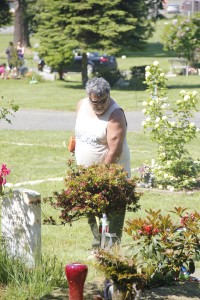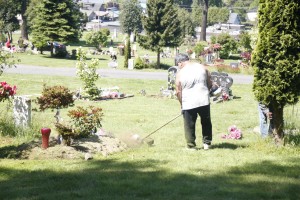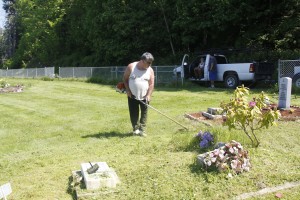Category: Tulalip News
May 28, 2014 syəcəb
Hash it out: A debate of popular facts and myths of marijuana use
By Andrew Gobin, Tulalip News
Marijuana, the scourge of our time. The gateway to a criminal underworld. The black market miracle medicine. Whether you are part of the outcry pleading for the legalization of marijuana or part of the opposition and fear created from reefer madness, we’ve all heard the propaganda and conspiracy theories. As Tulalip is faced with the decision to legalize or not, the issue has become shrouded in a haze of claims about the benefits and dangers of marijuana consumption. Results from a recent online survey conducted by the Tulalip Communications Staff highlighted some popular facts, misconceptions, and fears about marijuana consumption, which will be examined here:
Marijuana is harmless to smoke. There are no downsides, either for medical or recreational use.
False – Marijuana has many adverse effects on the human body. According to the Journal of the American Medical Association, heavy users of marijuana have long-term impairment of cognitive function, specifically with learning and the retention of new information. In testing, the American Academy of Neurology found that the rate of decreased productivity and cognitive impairment was directly related to the rate of increase in marijuana use.
Marijuana repairs the lungs, and actually is better for them.
False – The University of Washington Alcohol and Drug Abuse Institute reports that light use of marijuana, one to three times a month, caused no real harm or adverse effects on the pulmonary system. Heavy use, three to five times a week, caused a deterioration of lung tissue, and often contributed to users suffering a collapsed lung. In general, it is a lung irritant.
Marijuana repairs brain cells and promotes mental health.
True and false – This is a tricky aspect to understand, as it involves brain chemistry. The American Academy of Neurology explains that THC, the psychoactive cannabinoid in marijuana, inhibits the endocannabinoid system. The human endocrine system produces cannabinoid compounds in various organs. When THC is metabolized in the liver, the liver releases unusually high levels of endocannabinoids into the bloodstream. THC inhibits some of the cannabinoid receptors in the brain, which can help with mental disorders such as epilepsy and autism, yet the endocannabinoid compound levels are so high that the natural system becomes overstimulated. It is unclear exactly what the effects of overstimulation are.
It is certain, though, that marijuana users show signs of improvements in the nervous system, specifically growth and repair of nerve endings throughout the body, and nerve pathways in the brain.
Marijuana cures cancer.
True – Though not a cure, this claim is not entirely false. Reports from the American Cancer Association show that marijuana, in most cases, inhibits the growth of cancer cells, slowing down the aggressive nature of cancer. That same component works to prevent cells from binding together, which inhibits tumor growth.
Marijuana is not addictive.
False – While marijuana does not create chemical dependency, the way opiates and pharmaceutical drugs do, there is still a strong mental aspect to addiction. The overactive endocannabinoid system resulting from marijuana use creates a craving in the brain. Studies from the National Institute of Drug Abuse show subjects that have been clean of marijuana for more than a month still have long-term mental and behavioral effects, most notably an inability to feel satisfied with everyday life.
Marijuana is a great antidepressant and anti-anxiety medicine.
True and false – According to an article in Science News, marijuana, in low doses, is an effective antidepressant. However, heavy use, or prolonged use, can prove ineffective and even worsen depression, mostly in relation to the lack of satisfaction one experiences when they are not high.
As an anti-anxiety medication, low doses prove effective. Again, as use increases, anxiety can worsen. The National Institute of Drug Abuse, in addition to lack of satisfaction in everyday life, recorded a lack of coping ability with stress, leading to increased anxiety and irritability when not high.
Nobody has ever overdosed on marijuana.
True – There has never been a recorded overdose or death from marijuana consumption. The Australian Department of health conducted extensive tests on animals, looking at how much marijuana had to be consumed before a toxic level was reached. The result proved to be an unrealistic number. Though no humans were tested, for obvious ethical reasons, the hypothesized amount of marijuana needed to be consumed by the average human to reach a toxic level is approximately 8.5kg in one sitting. That’s 20lbs, or more than 300oz.
While there are no recorded deaths or overdoses from marijuana use, there are recorded deaths from the use of hash oil, though less than ten. Hash oil is processed marijuana, which extracts the THC from the marijuana leaves, and is on average five times more potent that marijuana. THC toxicity levels can be achieved in one sitting with the use of hash oil, especially by first time users. THC poisoning typically causes users to pass out. Most common resulting causes of death are apnea (the user stops breathing) or cardiac arrest.
Neither of these include statistics for accidents involving marijuana DUIs, or death related to impairment from marijuana use.
Marijuana is clean to use, there is no residue.
False – When you smoke marijuana, the residue from the THC seeps into fabrics, walls, and your skin. The Journal of the American Medical Association of Pediatrics reports a rising number of cases of infant and toddler marijuana poisoning. Most often, the cases are a result of contact with surfaces where marijuana has been smoked. The children absorb the THC residue through their skin. Symptoms recorded are excessive vomiting, irritability, and lack of balance, especially upon standing. Because they are infants and toddlers and vomit and fall often, these symptoms often go unnoticed. They are more easily spotted, though, in young children, preteens, and kids in their early teens.
These points were the most prominent points brought up repeatedly in the survey. Some are true, some are not, and some are exceedingly ambiguous. The answers here are what science has to offer for the marijuana debate.
Andrew Gobin is a staff reporter with the Tulalip News See-Yaht-Sub, a publication of the Tulalip Tribes Communications Department.
Email: agobin@tulalipnews.com
Phone: (360) 716.4188
Honoring Tulalip warriors: Memorial Day ceremonies commemorate their sacrifice
By Andrew Gobin, Tulalip News
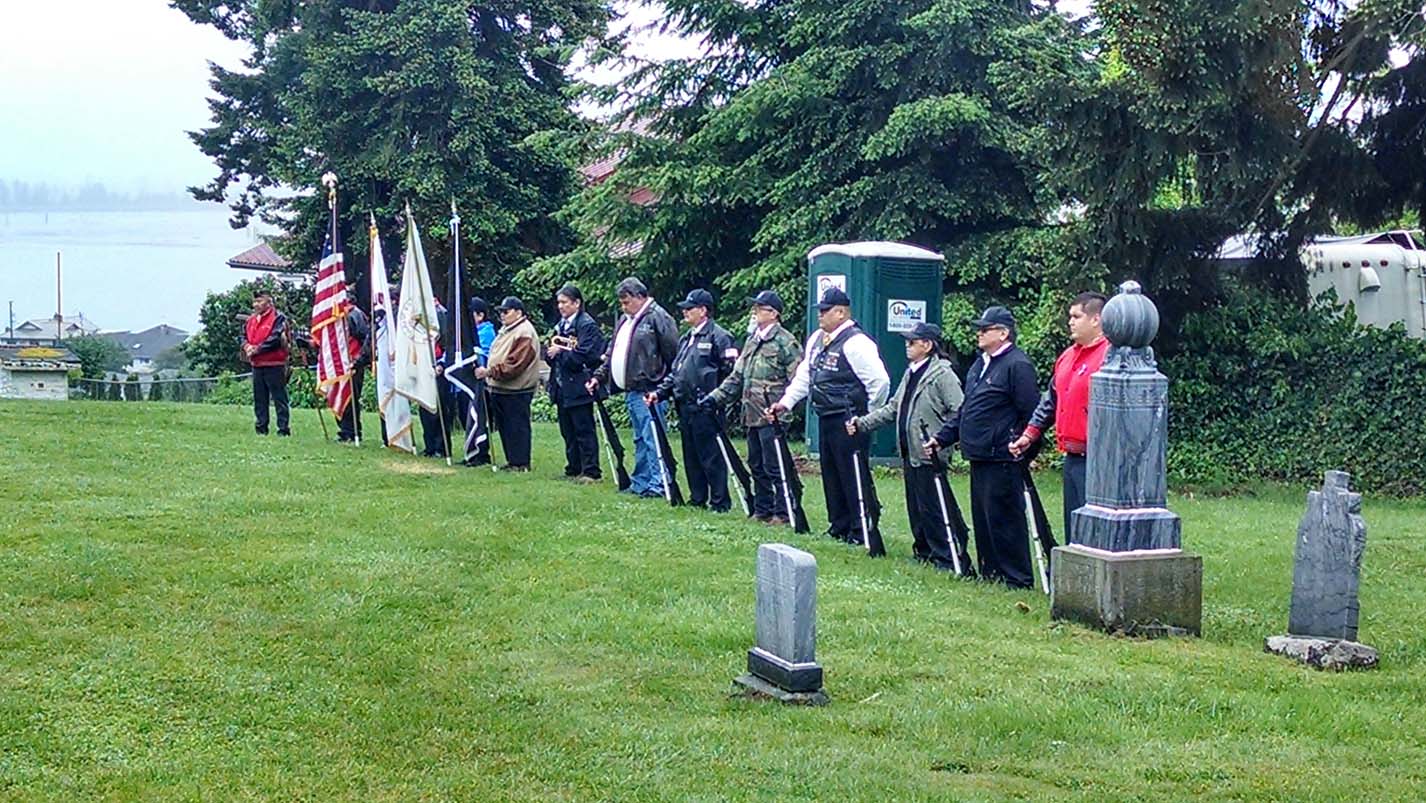
Tulalip veterans and their families, as well as the families of fallen soldiers, gathered at Priest Point and Mission Beach cemeteries Memorial Day, May 26, to remember the service men and women that gave their lives in the service of their country and to honor their sacrifice.
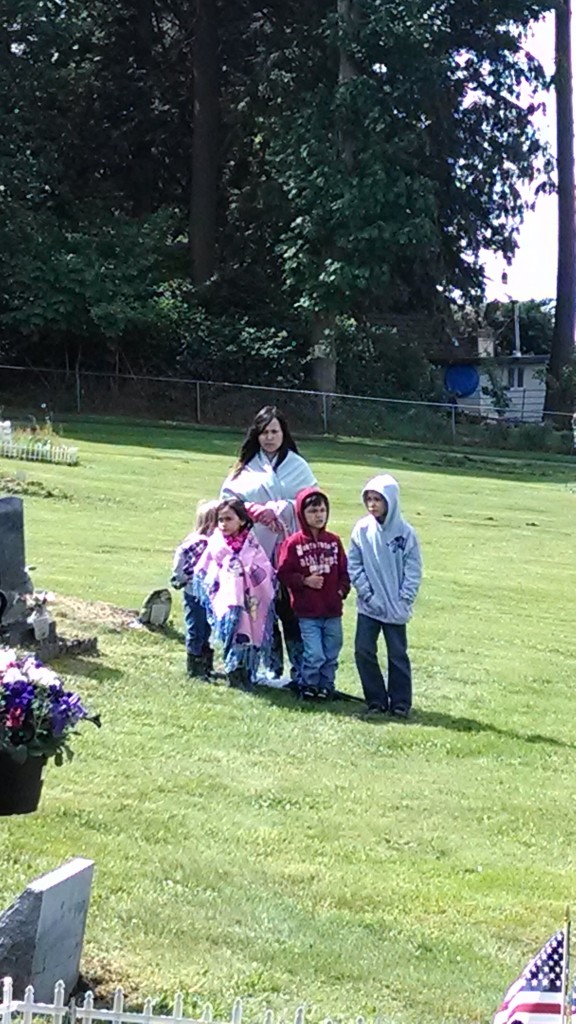
Tulalip Councilwoman Marie Zackuse said, “Today, we honor those that answered the call, when war came. Those that answered the call and made the ultimate sacrifice. We are grateful for what they did.
“We also are here to honor those ones that served and returned home,” she added. “Teat-mus always talks about going to war with his brother, and how he was killed right beside him. How hard that was for him.”
Veterans that spoke recalled their comrades and the loss of friends.
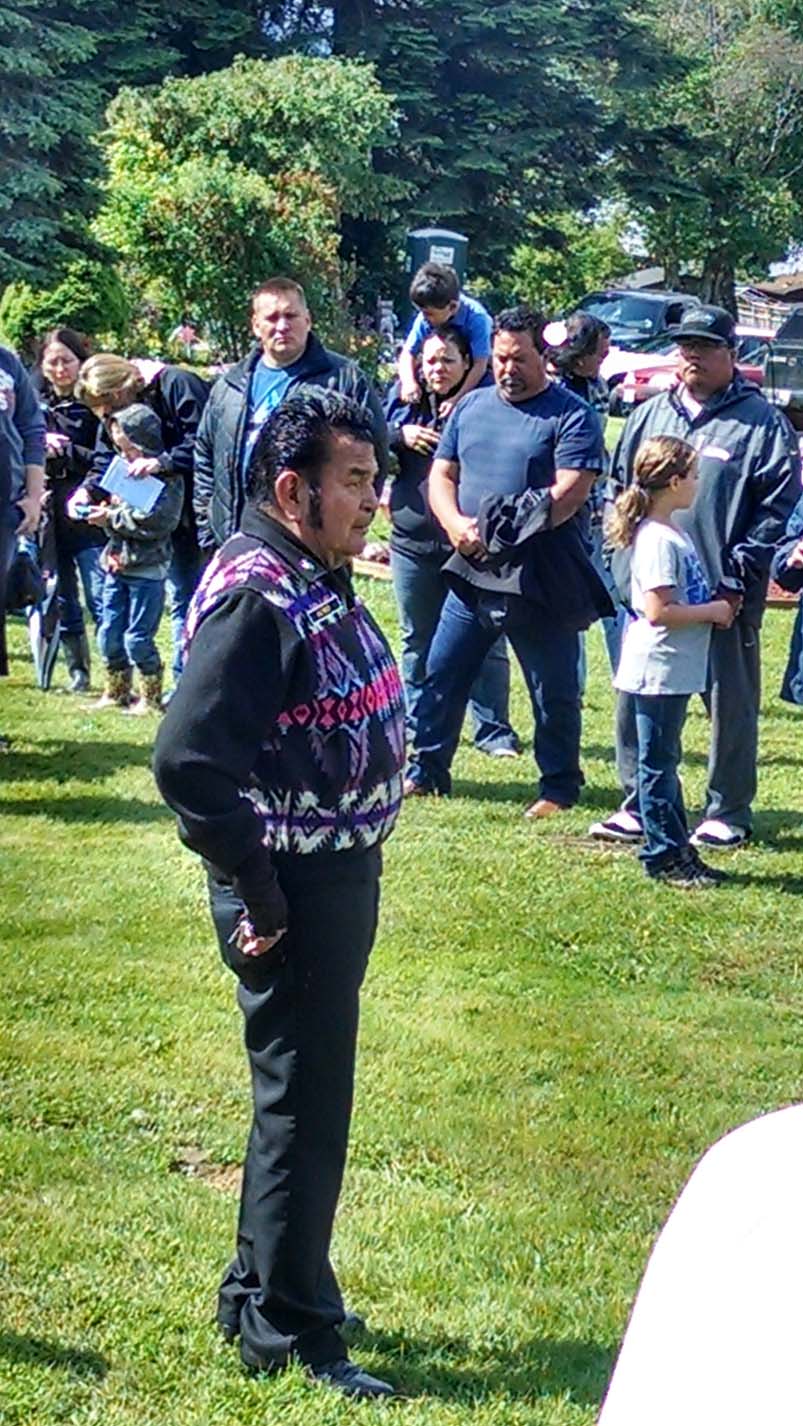
Tulalip veteran Cy Williams said, “Of the 150 men in my unit that went to Vietnam, 26 of us returned. I buried a lot of my friends.”
Memorial Day is a day to honor and remember the sacrifice many families made for this country, as the mothers bore the sorrow of their child’s sacrifice. The names of Tulalip Gold Star Mothers were called in the roll call.
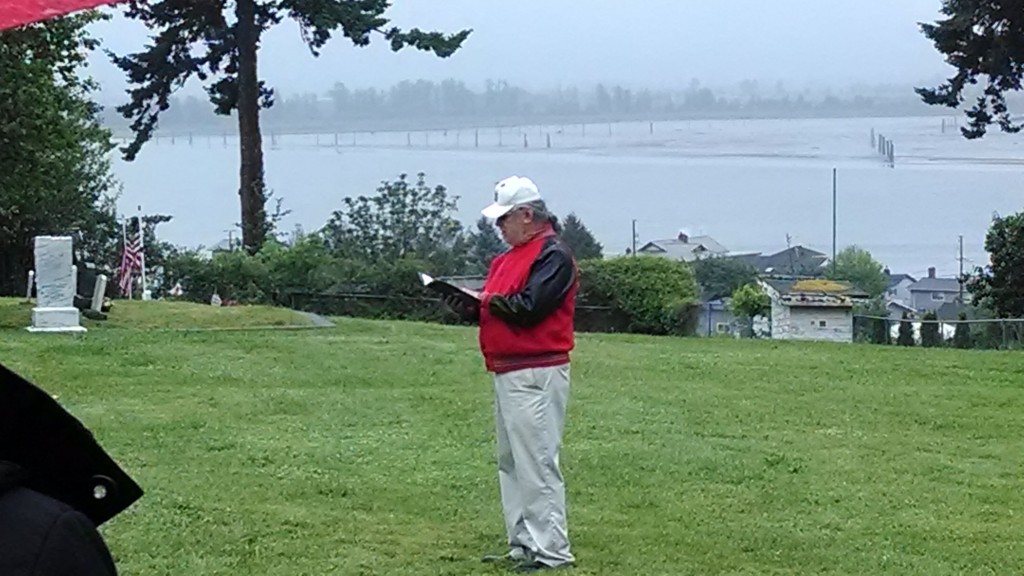
As Tulalip Veteran, Cy Hatch, read the roll call of fallen soldiers, he announced that, “This day is also dedicated to the Mothers who have made the supreme sacrifice. They have suffered more than any of us can possibly imagine – our hands are raised up to these Gold Star Mothers.”
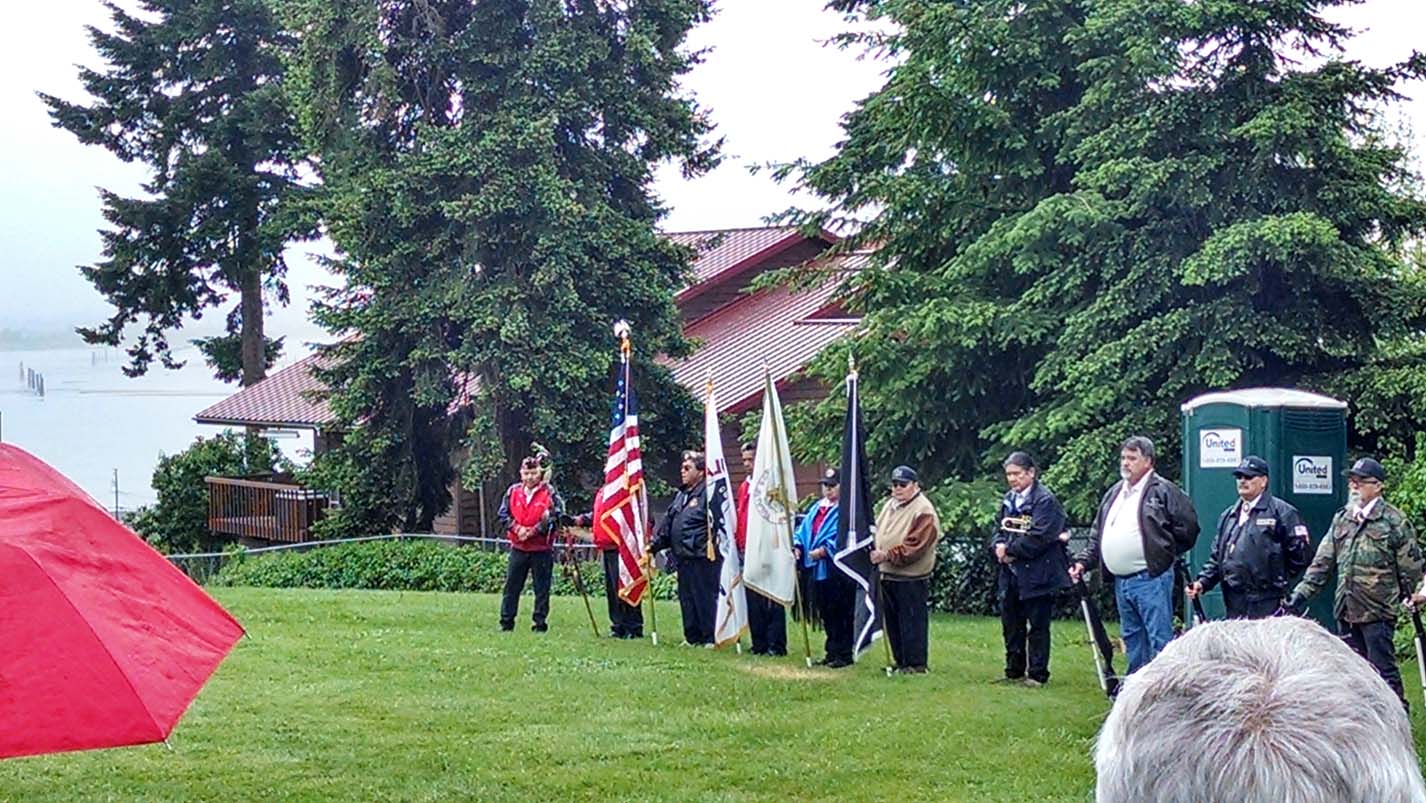
The 10:00 a.m. Memorial Day service at Priest Point Cemetery was carried out by the Tulalip Honor Guard, who stood steadfast through the pouring rain to honor the Tulalip warriors past and present. The weather cleared up for the 11:00 a.m. service at Mission Beach Cemetery, and the Tulalip Honor Guard, again, carried out their task impeccably.
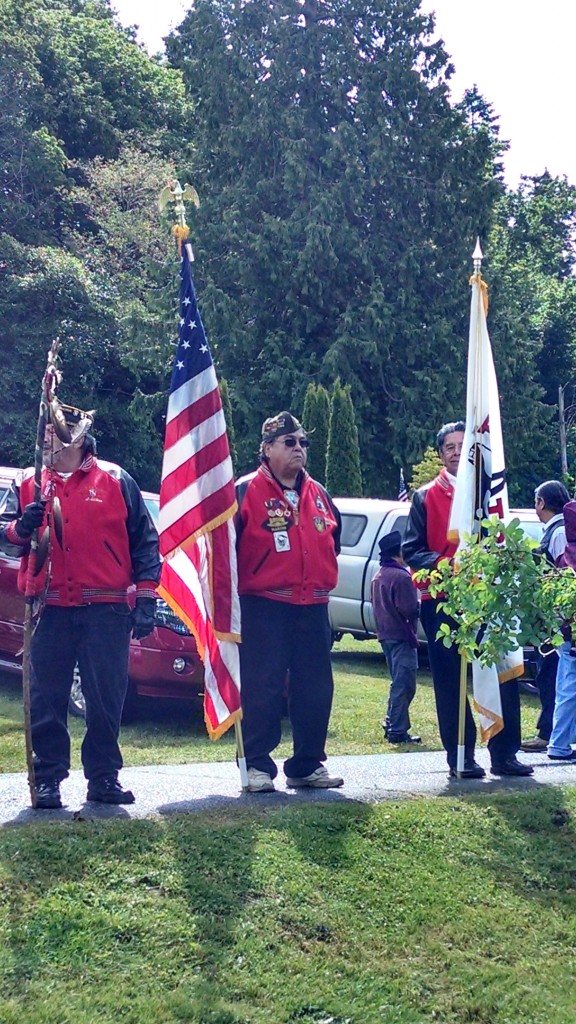
A special thanks was offered to four Veterans in particular. Mike Addie, Art Contraro, Tony Gobin, and Richard Muir Jr. cleaned up the two cemeteries over the three weeks prior, along with the Tulalip Maintenance staff, in preparation for the day’s activities.
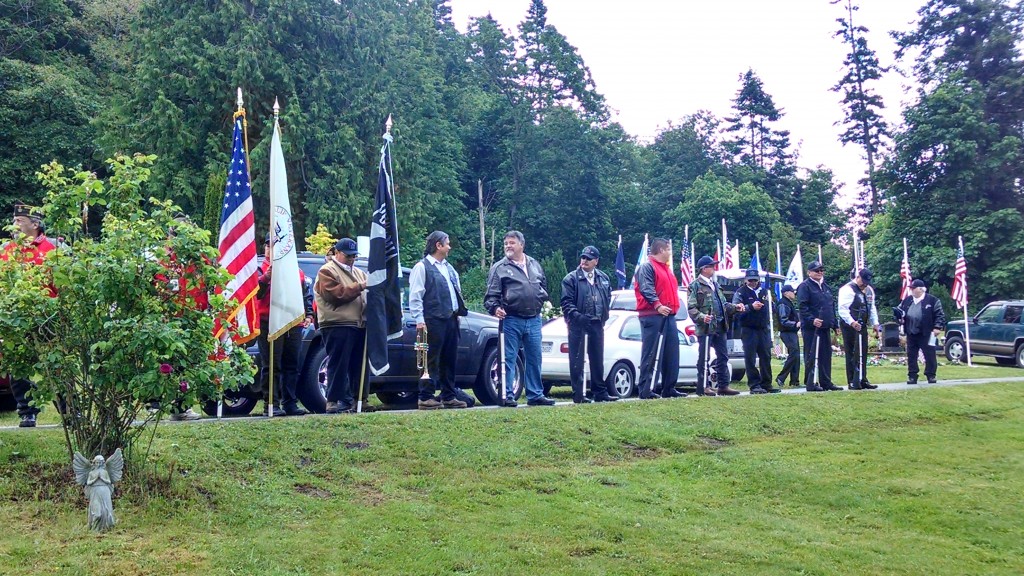
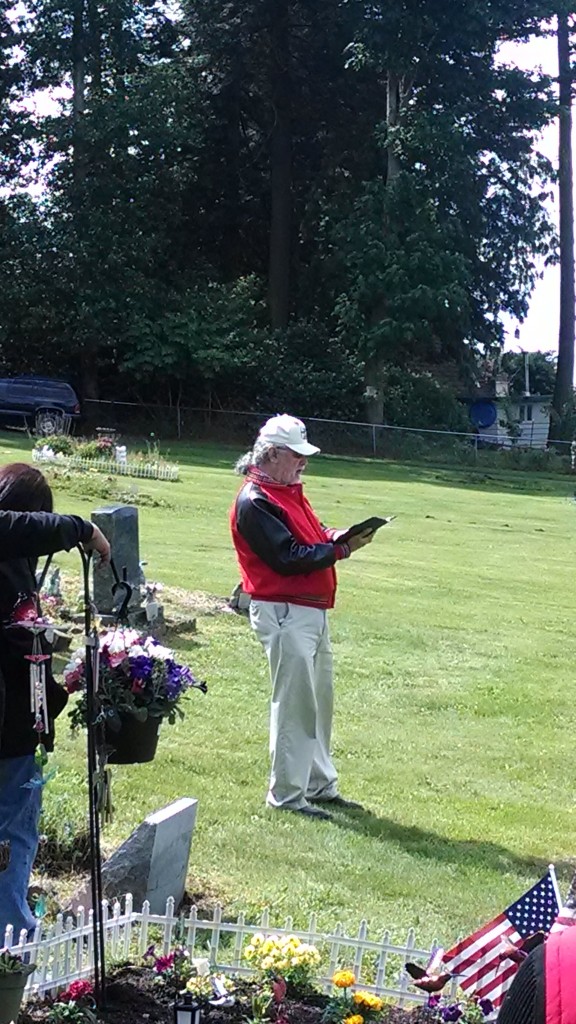
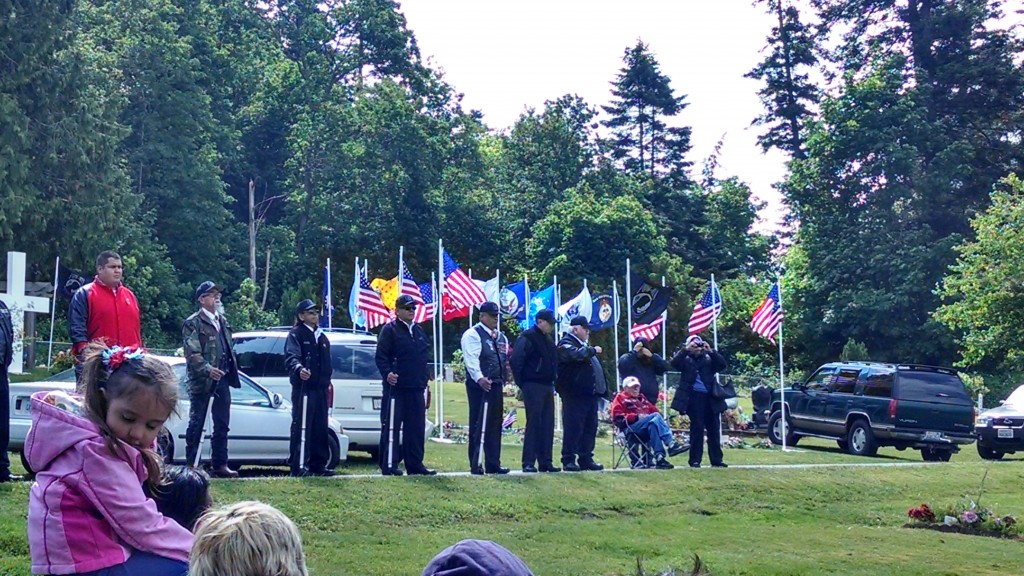
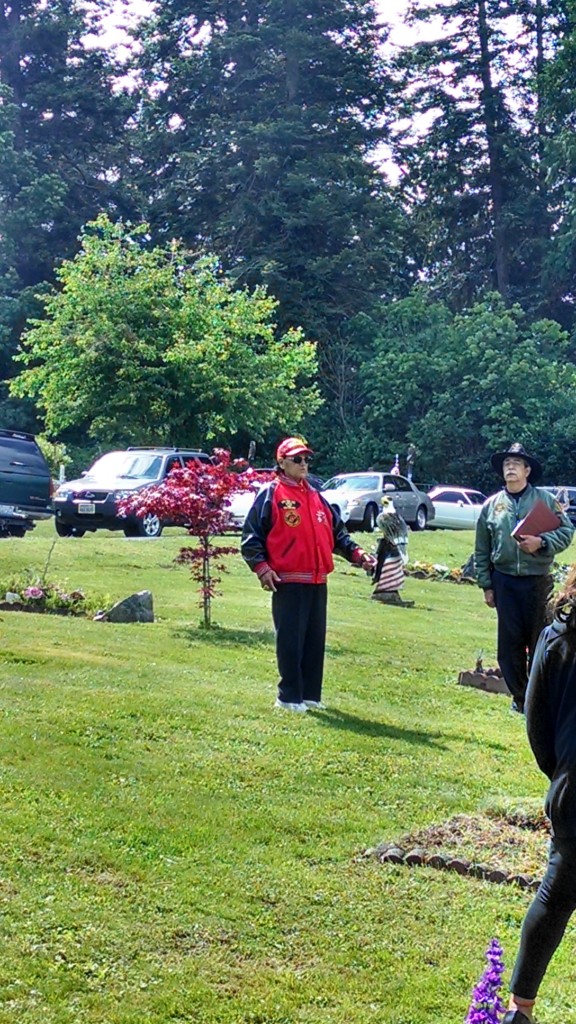
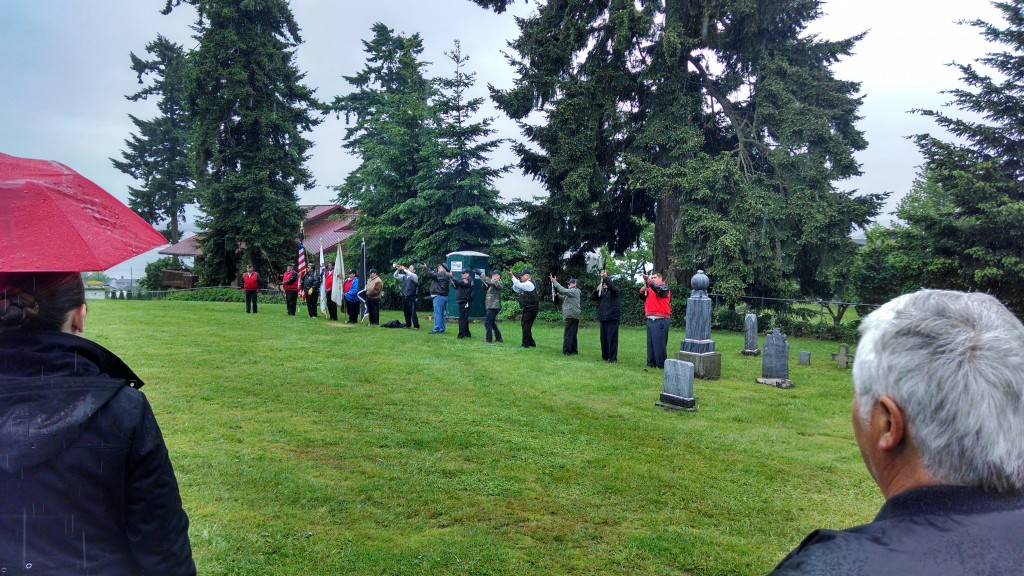
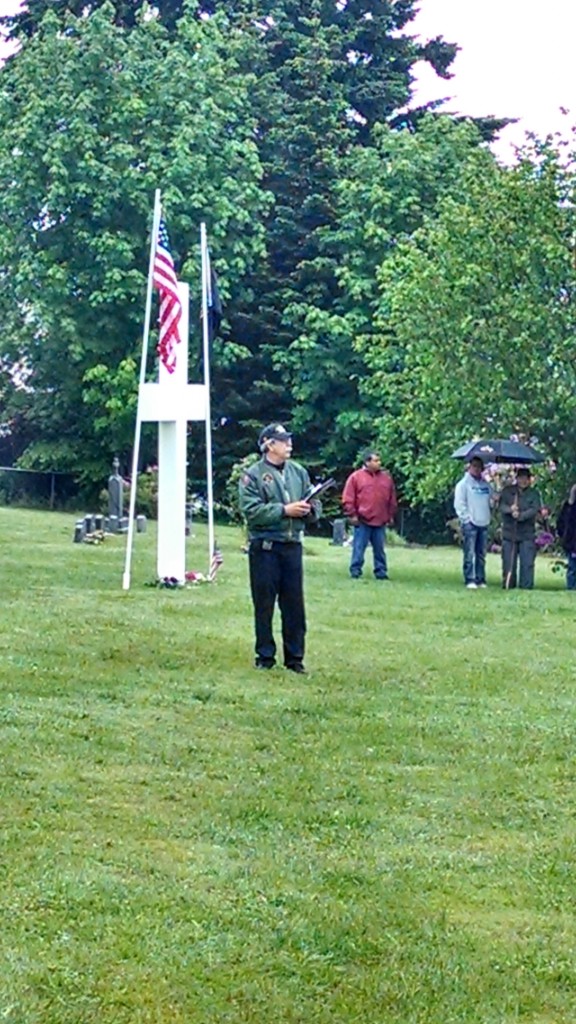
Gold Star Mothers (and fathers)
Tulalip Tribes − Priest Point Cemetery
UNKNOWN SOLDIER
CHARLES JR, JOSEPH
DAVIS, WILLIAM D.
GRAVES, WALTER
HATCH SR, CHARLES
HATCH SR, EZRA
JAMES SR, ELSON
LEWIS, CECIL
MOSES, WALTER
WILLIAMS, JESSIE
Tulalip Tribes − Mission Beach Cemetery
UNKNOWN SOLDIER
ADAMS, TOMMY
ADAMS, WALTER
ALEXANDER, JOSEPH G.
ALEXANDER, JOSEPH J.
ALEXANDER SR., WARREN
ARCHIE, ROBERT
ASHMAN SR, CHESTER
BAGLEY, ELMER
BAGLEY, RAYMOND
BAGGARLEY, JAY
BAGGARLEY, JUNIOR
BARTO, ROBERT
BEATTY, EDWARD
BLACKBIRD, JOSEPH
BOB, ALPHONSUS
BROWN SR. ELLIOTT
BROWN, FLOYD
BROWN, LAWRENCE F.
BROWN, ROBERT
BROWN, RONALD
BRUDEVOLD, JOSEPH
BURNS, JAMES
CAMPBELL, DONALD
CHARLES, ALVIN
CHARLES, LEO
CHARLES, WESLEY
CHARLEY JR, LAWRENCE
CHARLEY SR, LAWRENCE
CHEER SR, ARNOLD
CEPA, MARTIN
CLADOOSBY JR, ERNEST
CLADOOSBY SR, ERNEST
CLEARY, ROBERT CLIFFORD
COMENOTE, GEORGE
CONTRARO, GEORGE
COLE, JAMES
COY, JOSEPH
CRAFT, SR., WILLIAM RAY
CRAIG, GEORGE
CULTEE, HARRY
DELOS SANTOS, ARTURO
DOVER, GEORGE
DOVER, WILLIAM
DUNBAR, ERNEST
DUNN, HARRY
DUNN, JAMES
ENICK SR, GERALD JOHN
EYLE, PETE
FRYBERG, BYRON
FRYBERG, MYRON JAMES
FRYBERG, RAYMOND
GATES, PATRICK
GEORGE, JACK
GOBIN, BERNARD WILLIAM
GOBIN, EMERY
GOBIN, THOMAS JOSEPH
GRANT, CLAUDE
GRENIER, RICHARD
GRENIER JR, WILLIAM
HARRISON, ORVILLE
HATCH JR, ARTHUR
HATCH SR, CLARENCE
HATCH JR, CYRUS
HATCH, EZRA (ZANE)
HATCH, LAWRENCE (LARRY)
HATCH JR, LLOYD
HATCH SR, LLOYD
HATCH, VERLE
HATCH, WAYNE
HAWK, GORDON
HEGNES, HELMER
HENRY ALEX
HILLAIRE, PHIL
HILL SR, CHARLES
HILL, THEODORE
HOOD, AL
HOPKINS, ALFORD M.
HORNE, ROMEY A.
HOWARD, SHERMAN
JAMES SR, CHARLES
JAMES, JOHNNY
JAMES MICHAEL
JAMES, WILLIAM
JIMICUM, JOSEPH
JIMICUM, LARRY
JOBEY, JAMES
JOE, LAWRENCE
JOHN, ALBERT
JOHNNY, MARTIN
JONES, BAYARD
JONES, CARL (POLY)
JONES, DARRYL
JONES, DENNIS (JERRY)
JONES JR, GEORGE
JONES, LEONARD (PENNY)
JONES JR, RALPH (BREEZER) DELNO
JONES SR., WILLIAM
JOSEPH, BERNARD
JOSEPH, HAROLD
KEOKUK, JOSEPH
KONA, ISSAC (IKE)
KONA SR, RONALD KEITH
LACY SR, CECIL D.
LAMONT JR, LEVI
LAMONT SR, LEVI
LECLAIRE, ROBERT
LECLAIRE, ALAN
LEDFORD SR, ALAN
LYLE, GALEN
LYLE, WILLIS
MADISON, FRANK
MATTA, ART
MCCOY, RICHARD R. (DICK)
MCDEVEITT, JAMES
MCKAY, JR. ARNOLD
MCLEAN, WILFORD
MCLEAN SR, WILLIAM
MILLER, JOE
MONGER, JAMES
MORRISON, DERYLE
MOSES JR, KENNETH
MOSES SR, KENNETH
MOSES, MORGAN
MOSES, RONALD EDWARD
MOSES SR, ROBERT
MYERS, ROBERT EARL
NAPEAHI, JR., WILLIAM
NAPOLEON, HENRY
NUCHOLS, JOHN
OLIVER, CHARLES (MANNY)
PABLO SR, LOUIE
PATRICK, DANIEL
PAUL, HAROLD
PERRY, WILFRED
PRICE, LARRY
PRICE, PAUL
PROUTY, WILL
PYOTT, KENNETH
REESE, WILLIE
REEVES SR, CONRAD
REEVES, GEORGE
REHDER, CARL
RENECKER SR, ROCKY
RETASKET, GARY
RICE, GEORGE
RIVERA, CARLOS
RIVERA, JOHN
ROSS, JOHN H.
RYNER, HOMER
SAM, ALFRED
SANDERS, REGINA
SCHEEHAGEN, EDWARD
SHELDON, FRANCIS
SHELDON JR., LAWRENCE
SHELDON SR., MELVIN
SHELDON, ROBERT (BOB)
SHELTON, ALOYSIUS
SHELTON, CLARENCE
SHELTON, REUBEN
SHELTON, WILLIAM “BILL”
SMITH JR, GUS
SMITH, RUSSELL
SNEATLUM SR, CHARLES
SPENCER JR, RICHARD
STEVE, WILFRED
TAYLOR, CURTIS
TAYLOR JR, DALLAS
THOMAS, LOUIS
TOM, HARRY R.
TORY, JAMES
UPCHURCH, O. C.
VAN PELT, LEONARD
WALKER, GEORGE
WARBUS, JOSEPH
WELLS, WALTER
WILLIAMS, BENJAMIN
WILLIAMS SR, BERNARD
WILLIAMS JR, CHARLES
WILLIAMS SR, CHARLES
WILLIAMS, CHRIS
WILLIAMS JR, EDWARD
WILLIAMS SR, EDWARD
WILLIAMS SR, GEORGE
WILLIAMS, JOSEPH
WILLIAMS, KENNETH
WILLIAMS, LEONARD
WILLIAMS, MARVIN (SPUD)
WILLIAMS, RANDOLPH
WILLIAMS, RANDOLPH (RANDY)
WILLIAMS SR, RICHARD
WILLIAMS STEVE
WOLD, SEVERIN (SAM)
Andrew Gobin is a staff reporter with the Tulalip News See-Yaht-Sub, a publication of the Tulalip Tribes Communications Department.
Email: agobin@tulalipnews.com
Phone: (360) 716.4188
Green and Sustainable Living-NBSM Week 4
 By Monica Brow, Tulalip News Writer
By Monica Brow, Tulalip News Writer
Tulalip, WA-The final week of National Building Safety Month is all about creating and maintaining an energy efficient home. General electric has developed an online test that can be used to estimate the carbon footprint for each household and points out what levels you are at compared to the national average. This useful tool will give you an idea of where to begin when creating a more energy efficient home.
The usual and more common energy efficient methods that, if you haven’t already implemented one more you should do so, will save you money on water and electric bills along with helping out the environment. They include fitting your home with energy efficient doors and windows, proper home insulation, installing low flow toilets and shower heads, using LED or florescent light bulbs, and energy star appliances.
Some of the less common techniques aim toward sustainability through recycling. They include lessening garbage waste by recycling and saving kitchen scraps for garden composting. Install a rain water barrel to catch water for gardening. Use a manual lawn mower instead of electric or gas powered will save money and provide a workout. When building or renovating a home, find reclaimed building materials instead of buying new; this adds a uniqueness that isn’t mass produced and can be cost saving.
Carbon foot print calculator http://www.ge.com/ivillage/calculator/
For NBSM handout material or questions contact Orlando Raez of the Tulalip Tribes Community Development at 360-716-4214
10 tips for green and sustainable building
Heating and cooling uses more energy and drains more energy dollars than any other system in the home. Approximately 43% of utility bills cover heating and cooling.
Close curtains and shades at night to keep warmth in and keep them open during the day.
Try new lighting control technologies like motion-sensitive or timed off switch lighting. Using these new options can reduce lighting use by 50% – 75% and save the lighting portion of energy bills that account for 11% of overall household energy consumption.
Replace ordinary light bulbs with Compact Flurosent Light (CFL) bulbs. If every household replaced just one light bulb with a CFL bulb, America could save enough energy to light nearly three million homes.
Install a programmable thermostat to keep your home comfortably warm in the winter and comfortably cool in the summer.
Replacing windows can save between 7% and 24% of the household heating and air-conditioning costs.
Plug home electronics, such as TVs and DVD players, into power strips, and turn the power strips off when the equipment is not in use as TVs and DVDs in standby mode still consume several watts of power.
Choosing energy-efficient products can save families approximately $400 a year while reducing greenhouse gas emissions. Chose ENERGY STAR certified products when you buy or replace household appliances.
In the workplace, buy and use ENERGY STAR labeled office equipment, and other products. Be sure that the “stand-by mode” function is activated as this automatic “sleep mode” saves energy and money when the equipment is not in use.
Regularly change the filters in the heating and cooling system of your home or office as dirty filters can cost up to $5 a month extra, overwork the equipment and result in dirtier indoor air.
Consider purchasing “electrostatic” filters, which are washable, long lasting, and provide cleaner air. Clean or change filters more often if smokers or pollution sources are present.
Tulalip’s 2nd Annual Community Wellness Conference, June 10-11
By Alison Bowen
This year’s conference will focus on healthy relationships. Whether you struggle with your relationships or have a fantastic relationship with your partner, family or children, you will enjoy and learn a great deal from this conference. Presenters will provide helpful strategies to make all your relationships more stable, meaningful, caring and loving.
On June 10th , Sheri Gazitt will speak about “Communicating With Your Teen.” Ms. Gazitt is a teen educator who works for Seattle’s TeenWise. In her presentations, she delves into difficult topics that parents and teens face every day. You will leave the presentation with a refreshing outlook and some new tools for parenting your teen.
On June 11th, Drs. John and Julie Gottman, world renowned experts on marriage, relationships and family will present on “How to Make Relationships Work” and “Raising an Emotionally Intelligent Child.” Dr. Gottman and his wife, Dr. Julie Schwartz Gottman are the founding co-directors of the Gottman Institute, the Relationship Research Institute and the Gottman Institute’s Relationship Clinic. The Gottman’s presentations will help you realize that there is hope for every relationship!
Board member Deborah Parker attended one of the Gottman’s presentations. “It was a great experience! The speakers are sensible, practical and down-to-earth about relationships. They also put humor in their work. I encourage all tribal members to attend this conference!”
Our families are the center of our community. We would do anything to keep our families together. They are very precious and important to us. These great presentations can provide information that will be helpful in keeping our relationships stable, secure and together. We look forward to seeing you at this important conference.
For more information please contact Ashley Tiedeman, 360.716.5719
Children’s Reading Time at Hibulb Cultural Center
Marijuana: menace, medicine or moneymaker? Tulalip tribal leaders hold community meeting on the decriminalization of marijuana
By Andrew Gobin, Tulalip News
With the legalization of marijuana for recreational use in Washington State an ongoing discussion has emerged on the Tulalip Indian reservation about how the law will affect the Tulalip Tribes, if at all. Currently, marijuana remains illegal on the reservation in all forms, in accordance with federal policy. More than 100 people attended a community meeting on May 16, urging Tulalip to review its stance on marijuana, and consider whether the financial and medical benefits outweigh the potential risks that could jeopardize the tribes’ relationship with the federal government. A panel of experts made presentations at the meeting, speaking about the pros and cons associated with marijuana. The experts were; former Seattle Police Chief Norm Stamper, a proponent for legalizing or decriminalizing, and Officer Patrick Slack of the Snohomish County Drug Task Force, who gave a testimony to the use of marijuana in our community today.
“I do subscribe to the idea that the reefer madness propaganda of the 1930s created an unnecessary fear of marijuana,” began Norm Stamper, giving a brief historical overview of marijuana in America.
He said, “Marijuana prohibition has, in my view, done more harm than good. It causes more crime. Anyone who traffics in marijuana is a criminal, anyone who buys it is a criminal, and anyone who grows it. Sellers will arm themselves to protect their investments. We force people to seek out dealers, and they won’t card, they will sell to children. All too often they sell marijuana laced with harder drugs to cultivate a future customer. If it is legal, it can be controlled. We can regulate it, sell it, and use the money to fight it.”
That idea was well received at the meeting, as people spoke highlighting other drugs that plague the Tulalip community.
“It helps people stay away from that other stuff [meth and heroin]. We have a store out here, if we sell it we would have more money to treat other people that are on that stuff,” said tribal member Richard Jones.
An overwhelming majority of people in attendance echoed the potential use of marijuana as a safer means for addicts to get clean and stay clean, as well as the medical benefits marijuana users enjoy.
Patrick Slack did not take a stance on the matter, though he shared his experience with marijuana through his years on the police force which gave great insight to the history of marijuana culture and what it has become today.
He said, “There are many cannabinoids in marijuana that are beneficial. In my experience, most people smoke marijuana for the psychoactive experience, not the health benefits. Tetrahydrocannabinol, THC, is the psychoactive cannabinoid that gives users that signature euphoria from marijuana consumption.”
Historically, the THC in marijuana averaged less than two percent. According to Slack, what is being taken off the streets today ranges between twenty percent up to the mid-thirties. Something becoming more prevalent today is hash oil; also called dabs or budder. Through a reduction process using butane or octane (gasoline), people can pull more of the THC out of marijuana.
“The hash oil averages about ninety percent pure THC. It gets you very high, very fast, and is potentially dangerous to use because the effects last longer,” Slack explained.
Tulalip councilman Marlin Fryberg Jr. said, “For me as a leader, who looks out for the youth? That’s my responsibility. If legalizing marijuana will have a negative impact on them, then I can’t support it.”
Stamper noted, “People like Richard Nixon, JFK, Bill Gates, even Barack Obama have tried marijuana. Those people, had they been caught as a result of their youthful indiscretions, as Nixon called it, would not have enjoyed the careers they did, and we would not be enjoying the benefits of their success.”
Slack addressed the difference of underage use today than in Nixon’s time, and the implication from Initiative 502, the ballot measure that legalized marijuana for recreational use in Washington State.
“I502 makes the consumption marijuana illegal to persons under the age of 21, specifying that there is no tolerance for underage consumption. That means if you are driving and you get stopped, if you are suspected of marijuana use, and you are underage, then you will be subject to a blood test. If cannabinoids are found in your blood, you are guilty of a DUI (Driving Under the Influence), whether or not you are under the legal limit of five nanograms. That’s a felony. And today, that limits your ability to get scholarships, go to college, and get a job.”
The legalization of marijuana is a tumultuous issue that has many potential ripple effects for tribes which would extend far beyond the business and moral aspects, should they choose to legalize. For Tulalip tribal leaders, they are torn on the issue.
Tulalip tribal councilwoman Theresa Sheldon said, “Our grants require us to be in compliance with federal policy. NAHASDA (The Native American Housing Assistance and Self Determination Act) for example explicitly says that the tribe’s program must comply with the all federal policies; that includes policies regarding drugs. Marijuana is still classified as a schedule 1 controlled substance at the federal level. It is unclear how legalization will affect our programs, but it is something that we need to understand fully before we proceed.”
“When it comes to medical marijuana, I am there,” said councilman Fryberg. “I’ve done a lot of research, and it took me some convincing, but I’m there. I don’t support the recreational use, though, and I don’t know that I ever will.”
Whether tribes decriminalize or legalize, the decision will have federal implications. The community and some tribal leaders seem to agree though, that the time has come to recognize marijuana as a medicine. What that means for regulation remains to be seen.
Andrew Gobin is a staff reporter with the Tulalip News See-Yaht-Sub, a publication of the Tulalip Tribes Communications Department.
Email: agobin@tulalipnews.com
Phone: (360) 716.4188
May 21, 2014 syəcəb
Memorial Day Preparations
By Andrew Gobin, Tulalip News
Memorial Day will be observed on Monday, May 26 this year. The Tulalip Veterans Department has been working hard to prepare for the ceremonies, cleaning up the cemeteries and placing flags.
Mike Addie, Tony Gobin, and Richard Muir have been working at Priest Point and Mission Beach cemeteries, cleaning up gravesites and doing a bit of landscaping.
“We work on all of the graves, not just the veterans. We want all of the families to be well represented that way,” said Richard Muir.
The three veterans have been working for a few weeks, and will be finished for this weekend’s activities in observance of Memorial Day. Services will be Monday, May 26, 10:00 a.m. at the Priest Point cemetery and 11:00 a.m. at the Mission Beach cemetery.
Andrew Gobin is a reporter with the See-Yaht-Sub, a publication of the Tulalip Tribes Communications Department.
Email: agobin@tulaliptribes-nsn.gov
Phone: (360) 716.4188













